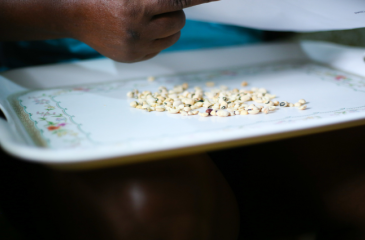This post is part of our "Bioethics in Focus" series featuring experts from the Center for Bioethics community.
About 800 million of the world’s 8 billion people are food insecure; 3.1 billion are unable to afford a healthy diet, and about 2 billion people are obese (FAO, IFAD, UNICEF, WFP, and WHO, 2022). With food scarcity and obesity gripping the world, mainly due to manmade omissions and commissions, all food systems actors are called to the table. Bioethicists are food systems actors and should invite themselves to the table.
As a public health advocate, I am deeply invested in promoting, protecting, and supporting actions that respond to the abovementioned challenges, and those that aim to assure health equity. After training formally in nutrition, public health, and bioethics, I spent ten years researching how to leverage public health's socio-cultural, socio-ethical, and medico-ethical dimensions to promote the health of women living with HIV. Currently, my research and professional practice leverage bioethics (particularly food ethics, public health ethics, health and human rights); and public health nutrition (food systems, food environments, and their nexus with nutrition-related non-communicable diseases) for global public health.
Over the past three years, I have led food activism work by contributing to ongoing discourses about food security, food systems, food environments, food ethics, food policy, food politics, food democracy, and food justice. Herein, I share how we used evidence-informed advocacy and scholarly activism to increase the demand for healthy food policy in Ghana.
Food security means “all people at all times have physical, economic, and social access to sufficient, safe, and nutritious food that meets their dietary needs and food preferences for an active and healthy life” (World Food Summit, 1996). Assuring this continues to challenge many nations (FAO, IFAD, UNICEF, WFP, and WHO, 2022). Although we all agree that having adequate food is a basic human right, the realization of this right by rights-holding citizens is not automatic. The problem is usually understood by all but not the solution. Today, a significant part of the issue is not just feeding the world’s hungry people but nourishing them and within planetary boundaries.
In Ghana, like other African countries, we are experiencing a rise in obesity and other nutrition-related non-communicable diseases (NCDs) in addition to food insecurity and micronutrient malnutrition. An analysis of 1993–2015 reveals over a 300% increase in the prevalence of adult obesity in Ghana (GSS et al., 2015). Over 40% of adult deaths in Ghana are attributable to NCDs – according to data from the country’s Ministry of Health. The prevalence of undernutrition and the tidal wave of obesity are sometimes said to be a consequence of market failure. I agree; food systems failure is a classic case of market failure.
My colleagues and I engaged individuals, communities, and local and national stakeholders to respond to such failures. Our goal was to improve Ghana’s food environments – in part through healthy food policy. Because limited data frustrates such policy efforts, we first focused on generating local evidence through a series of research projects.
- The Dietary Transitions in Ghanaian Cities project mapped the factors in the social and physical food environments that drive the consumption of energy-dense, nutrient-poor food and beverages.
- The ‘MEALS4NCDs project’ provides Measurements, Evaluation, Accountability, and Leadership Support for NCDs prevention in Ghana.
- The ‘Healthier Diets 4 Healthy Lives (HD4HL) Project’ aims to develop, validate, and build consensus for a fit-for-local-purpose nutrient profiling model for food-based policies' implementation.
- The Advocating for Health (A4H) Project is designed to create a favorable environment and stakeholder buy-in for food-related fiscal policies in Ghana.
We generated and curated evidence and shared it with Ghanaian researchers, policymakers, and civil society actors. Through dietary intake and time use study, we assessed how unhealthy food and beverages are embedded in everyday life (Holdsworth et al, 2020). We used novel qualitative methods to identify factors shaping dietary behaviors (Pradeilles et al., 2021). We showed how unhealthy food is advertised and sold through geographical mapping studies (Green et al., 2020). Our television monitoring, outdoor food advertising assessment, and supermarket assessment revealed heavy marketing and widespread availability of unhealthy foods (Laar et al., 2021). The evidence-informed the development of policy recommendations to improve the healthiness of the Ghanaian food environment. Recommendations included the development of policies that account for people’s lived environments and encompass regulatory, legislative, and fiscal measures. But are Ghanaians ready for such?
Our community readiness assessment helped gauge Ghanaian communities' readiness to accept and implement those policies (Pradeilles et al., 2019). This work birthed the HD4HL, and the A4H Projects, which are currently delivering multi-stakeholder action toward a fit-for-local purpose food-based policies. As a result of five years of food advocacy and activism, there is currently a national consensus that enacting and implementing such policies could make unhealthy foods unaffordable, unattractive, unavailable, or inaccessible. The policies in question are front-of-pack nutrition labeling, marketing regulations, food-related fiscal policy, food safety policy, trans fatty acids elimination policy, public food procurement policy, and food-based dietary guidelines.
In selecting, prioritizing, and bundling these policies, we considered several things, including Ghana’s public health nutrition landscape and the agency of food environments’ stakeholders, including consumers. Intervention agency refers to the resources (e.g., personal, psychological, cognitive, financial, material) that individuals draw on to engage successfully with an intervention (Adams et al., 2016). Our policies include strategies that seek to "inform and empower," "guide and influence," and "incentivize, discourage, or restrict" patronage of unhealthy diets. We included a good mix of both low and high-agency interventions. We ensured interventions requiring individuals to invest fewer personal and psychological resources were front and center for our advocacy. For example, low agency interventions include wholegrain fortification with micronutrients, marketing restrictions, fiscal policies, and product reformulations. At the same time, we included others such as educational interventions, mass media campaigns, and front-of-pack labeling, which usually require substantial agency in terms of accessing, understanding, and applying the information provided.
Advocating for healthy food policy to any government is to recognize and respect the government's mandate. The role of governments in protecting, promoting, and assuring the health of their citizens is primarily grounded in national legislation, policies, and international conventions. One vital step in making this right of citizens realized is to make our food systems and environments more equitable, ethical, and democratic. A core part of our advocacy is nurturing food systems/environments that are just and sustainable (conducive to human, animal, environmental, and overall planetary health). Our coalition recognizes that we are not only doing this for the present but also for future generations – including our children (born and unborn). Reiterating the admonitions of one wise old man from Africa, "the unborn generation is not waiting to inherit the future from us; we have just borrowed the present from them…" I believe bioethicists, as food systems actors, have an opportunity to contribute to safeguarding this borrowed resource – our planet's food systems.



